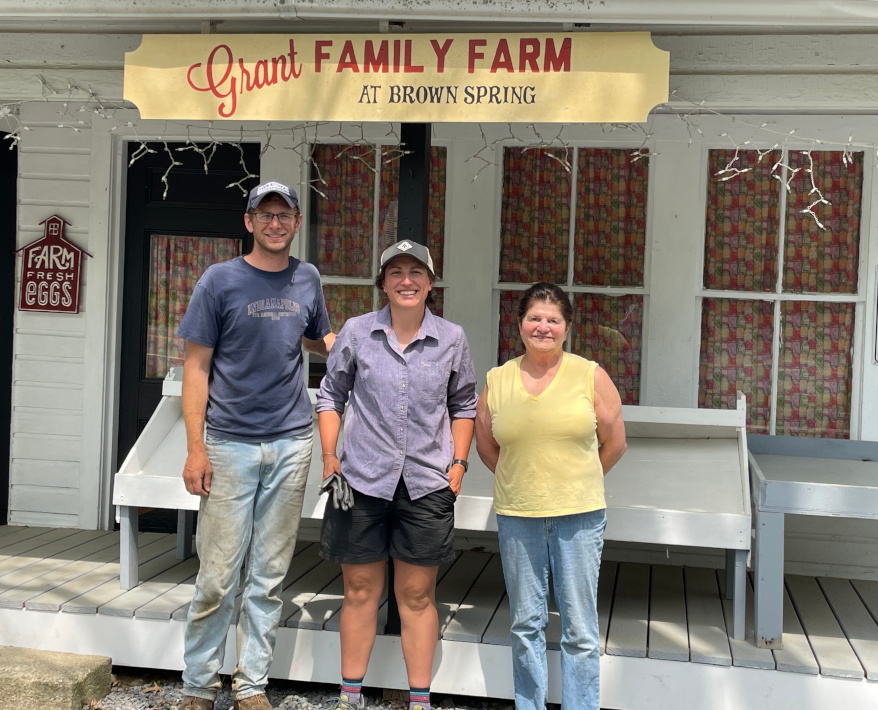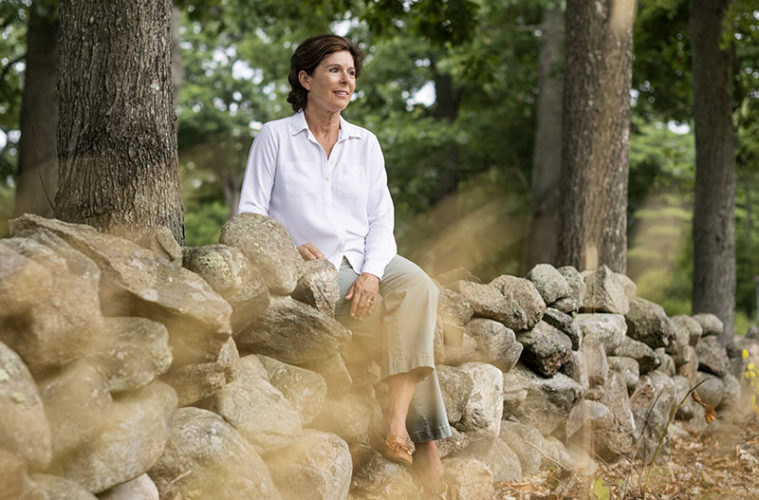Chris Grant started farming professionally when he was in high school. He sold pumpkins and vegetables by the side of the road, and then began raising perennials for landscapers and garden centers. He studied agriculture in college and graduated confident he wanted farming to be his career.
The problem was finding land to grow his business on. His family’s farm in Essex wasn’t large enough to sustain the operation he envisioned, but the price of buying a sizable plot of land was just too high.
That is, until he partnered with the Essex County Greenbelt Association. First, Grant worked out a deal to buy 10 acres in West Newbury that had formerly operated as Brown Spring Farm. Then, he immediately sold the development rights to the land to Greenbelt and the town of West Newbury, including in the transaction a restriction that prevents the property from ever being used for anything other than agriculture.
The sale of the development rights put the cost of the land within reach, while also preserving a valuable parcel of historic farmland, where Grant now operates Grant Family Farm, raising carrots and leafy greens and dahlias and snapdragons, and selling what he grows from a farm stand that has served the community for 70 years.
“No matter what happens to me, long after I’m gone this place will still be here,” Grant says, “so I consider that a win for everybody.”

Grant’s acquisition is the kind of success story Greenbelt has been pushing for throughout its 60-plus-year history. While many North Shore residents know of Greenbelt as the steward of popular outdoor destinations like Rough Meadows Wildlife Sanctuary in Rowley and Tompson Street Reservation in Gloucester, the heart of its mission has always been land conservation.
The organization began in 1961 when residents banded together to save Boxford’s Bald Hill from development. Today, it manages the conservation of 17,500 acres throughout the county.
“Our mission is to conserve land,” says Cathy Lanois, director of development and community engagement at Greenbelt.
Benefits and challenges of conservation
Land conservation has many benefits, the organization maintains. Undeveloped land will help keep communities and ecosystems resilient to climate change. It protects wildlife and nurtures a sense of connection to place. It helps keep air and drinking water clean and strengthens local food systems.
Because the laws, conventions, and emotions surrounding land transactions are so complex, the conservation process can follow many paths, Lanois explains. Some people approach Greenbelt to find a way to ensure their property is protected from development after their deaths. Other times, the organization reaches out to people who own land adjacent to important ecosystems to ask if they can find a way to help preserve the area.
Greenbelt has a sophisticated analysis process that decides what land should be prioritized in light of its finite budget and resources. Using a computer mapping system, the organization can look at how individual parcels contribute to wetland preservation, soil quality, rare species protection, climate resilience, or other desirable goals.
The method of conservation also varies. Sometimes Greenbelt buys the land outright. In other cases, Greenbelt uses its considerable expertise to help connect property owners to programs or resources that will help them protect the land.
Other times the ownership remains the same, but Greenbelt uses agricultural or conservation restrictions to ensure the land remains untouched. The organization might pay for these restrictions, often in partnerships with other groups. Or a landowner may donate agreement to the restrictions. Greenbelt then becomes legally responsible for monitoring the property and ensuring the conditions in the restriction are being upheld.
“Every situation is different, and it’s really a matter of building solid and trusted relationships,” Lanois says.
Greenbelt has, for example, helped a couple in Ipswich ensure a large part of their 21-acre parcel would be preserved, while retaining the pair’s right to build a house on a portion of the land. The organization worked with a Salisbury property owner who agreed to sell a wooded parcel at below-market rates to safeguard the land into the future.
In 2019, Greenbelt bought historic Green Meadows Farm in Hamilton, a property once owned and farmed by World War II general George S. Patton and his descendants. Greenbelt then leased the land to Iron Ox Farm for a term of 99 years, allowing young farmers Stacey Apple and Alex Cecchinelli to expand their operation and make real investments in their business’s future.
Greenbelt’s dedication to finding new models for protecting land—and new ways to use existing tools—has been invaluable to conservation efforts in the region. Grant, for one, says his thriving operation wouldn’t have been possible without the organization’s knowledge and assistance. And he is pleased that the plan they worked out not only lets him farm the property today, but also ensures it will remain agricultural land for many decades to come.
“It’s one thing to protect land, but it’s another thing to keep it working,” Grant says. “I doubt it could’ve happened without Greenbelt—they really get it.”

